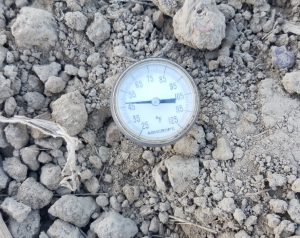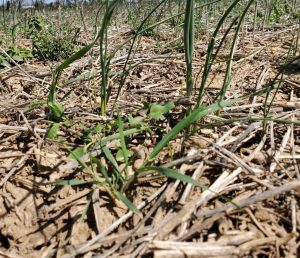
Soil temperature, Woodstown NJ. April 22
Some producers took advantage of their efforts to fit fields last week and have planted full season beans at the time of this post. Soil temperatures were above 55ºF to 60ºF at planting. Peas and potatoes are also planted.
A cold front last night coupled with gusty winds dropped surface soil temperatures below 50ºF in the Woodstown area.
Should pre-emergences go on at this temperature? Soybeans and other Fabaceae seeds like peas will swell and germinate within twenty-four hours of planting if there is adequate soil moisture. But under cool conditions, twenty degrees below ideal (>70ºF), don’t expect to see plants come out of the ground until soil temperatures warm up. Which is forecasted to gradually occur over the next ten days. That is plenty of time to get preemergent herbicides on before crop and weed seeds germinate. If the weather cooperates. Which at this hour, looks favorable for application Friday and Saturday mornings in Salem County.
The current forecast for the Woodstown, NJ area is for less than an inch of rain Saturday into Sunday morning. Enough to activate preemergent herbicides. But locally heavy downpours are possible.
Herbicide injury is more likely on cold, very wet, coarse sandy soils until soils warm. Cold wet conditions that slow emergence of soybeans ,and after a root and shoot inhibiting herbicide have been applied, can result in herbicide injury. Slower emergence means more time for the herbicide to be absorbed into emerging shoots and roots. What we don’t want is open furrows, on low organic soils as this only increases the likelihood of injury while soils are cold and wet.
Residual, pre-emergent to the weed seed germinating. Some soybean products like sulfentrazone can be applied a month before the crop is planted but warn of significant injury after excessive rainfall or in poorly drained soils. Others specifically state application up to fourteen days prior to planting; or apply after planting. There is somtimes a two-week application restriction between pre-plant incorporated; pre-plant surface timings; and the allowed after planting application on the same label for the same active ingredient for crop safety purposes. Others have no such restrictions. Before spraying, consider the forecast, current and future soil conditions, and read through the herbicide label as this information is not always in the same paragraph.
Why the forecast after planting matters: Heavy rainfall can push pre-emergent root and shoot inhibiting herbicides below the weed seedbank germination zone. Defeating the primary purposes of this application to prevent weed seeds from germinating. For weeds resistant to the post herbicides available (palmar amaranth, common ragweed, marestail) few options remain. Conversely, we need rainfall to activate soil residual products.
No application before weeds germinate is just as concerning. Emerged weeds are not controlled by pre-emergence herbicides. We don’t want soil temperatures to reach the optimum for weed seed germination before application. Common ragweed and common lambsquarters will start germinating after soil temperatures rise above 50ºF. For Palmer Amaranth and other pigweeds, anticipate weed seed bank to flush when soil temperatures are approaching 60ºF degrees; and negligible when day and night time temperatures continue to fluctuate below 50ºF.


